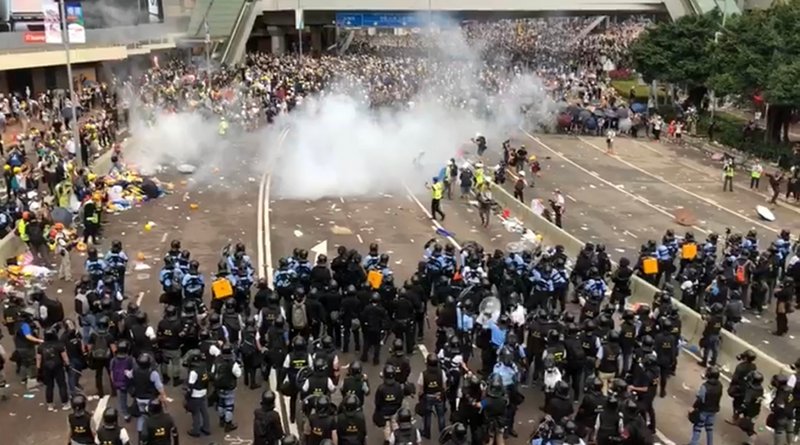A Lonely Struggle In Hong Kong – Analysis
By Observer Research Foundation
What is astonishing is the sheer incompetence with which the ground realities are being dealt with by the State machinery.
By Harsh V. Pant
History, it seems, is knocking on Chinese doorsteps and Beijing is getting panicky. The situation in Hong Kong is getting murkier by the day and the Chinese Communist Party is behaving as if this is the 1960s when brute repression would have no consequences. That Xi Jinping’s China has no coherent strategy to deal with the situation is quite evident but what is astonishing to see is the sheer incompetence with which the ground realities are being dealt with by the state machinery. Clearly, we live in interesting times.
The Hong Kong issue was never an internal matter for China. The very system of governance ensures that the international community would have a stake in how the political system evolves in an autonomous territory of China which was once a British colony for a more than 150 years. And so a bit late but the UK too entered the fray warning China it could face “serious consequences” over its treatment of protesters in Hong Kong even as the nation’s Foreign Secretary Jeremy Hunt who aspires to be the British Prime Minister “condemned all violence.” Chinese Ambassador to the UK Liu Xiaoming retorted back saying that relations between China and the UK had been “damaged” by Hunt’s comments and others backing the demonstrators’ actions. And Chinese Foreign Ministry lambasted Hunt for “fantasising in the faded glory of British colonialism and obsessed with the bad habit of criticising and lecturing on other countries’ affairs condescendingly.”
For the UK it is important to be seen to defend a treaty it signed with China in 1984 guaranteeing Hong Kong’s freedoms and relative autonomy. In 1997, under the principle of “one country, two systems,” Hong Kong became part of China with an understanding that it would enjoy “a high degree of autonomy, except in foreign and defence affairs” for 50 years. Now that very principle is under challenge with an extradition law that would allow extradition from Hong Kong to mainland China. There has been a backlash against this law as hundreds of thousands of Hong Konger’s have taken to the streets in recent weeks to protest against this proposed extradition bill which they fear would be used to target political dissidents. Last week, student protesters stormed and briefly occupied the city’s legislature and were driven out by a major police operation after they caused widespread damage to the building. Protestors are demanding a complete withdrawal of the extradition bill and an unconditional release of all arrested protestors.
Hong Kong’s chief executive, Carrie Lam, has been under enormous pressure because of her mishandling of this situation as this is a bill championed by her. But underlying the anger against the bill, there is widespread anxiety about the future political trajectory of Hong Kong as Beijing relentlessly pursues an agenda of diluting civil liberties of its residents. There has been a partial climb down from Lam to the point where she has suggested that the bill is “dead” but protests continue with no let up in sight.
Chinese President Xi Jinping has been clear about the need to increase Chinese hold over Hong Kong and under him Beijing’s influence has grown considerably to a point where the discussion of political reforms have been marginalised completely. It is Beijing that decides who governs Hong King and only half the seats in the legislature are filled by popular elections. So in some ways Hong Kong protests are a personal challenge to Xi whose strongman image will come under question if the situation is not handled faster. Taiwan is already closely watching the developments in Hong Kong.
As such it is unlikely that Beijing will buckle under pressure. It is already moving to tackle the protest leadership and will make sure that message goes out that challenging Beijing will entail significant costs. China has been repressive towards its minorities in Tibet and Xinjiang to the point where there has been mass internment of ethnic Uygurs and Muslim minorities. According to various estimates, up to 1 million Uygurs and other Muslims are being detained in Xinjiang, with extensive mass surveillance used to crack down on the inhabitants’ practice of Islam. Reports have now emerged that foreigners crossing into Xinjiang are being “forced to install a piece of malware on their phones that gives all of their text messages as well as other pieces of data to the authorities.”
And all this repression has happened without any challenge from the wider international community which is more worried about making money from the Chinese economy. The Trump Administration has prioritised its trade dispute with China with President Donald Trump telling Xi Jinping that the US would mute its support for the anti-China protests in Hong Kong in exchange for re-opening US-China trade talks. The EU is busy fighting its own internal demons. The UK has challenged China but is unlikely to sacrifice its wider relationship with Beijing for the sake of some pesky protestors on the streets of Hong Kong. Other major powers like India have much bigger challenges to tackle with China. In any case, New Delhi had burnt its fingers when in 2016 it gave visas to some activists from Hong Kong for a democracy conference in Dharamshala. It is unlikely to repeat the same mistake when it had to cancel these visas at the last minute after Chinese protests.
So sadly Hong Konger’s will have to fight their own battles against one of the mightiest economic and military establishments of our times. The fact that they have dared to and forced a partial retreat is impressive enough. Their only solace might be the words of Martin Luther King Jr. that “the arc of moral universe is long, but it bends towards justice.”
This article originally appeared in The Telegraph.

